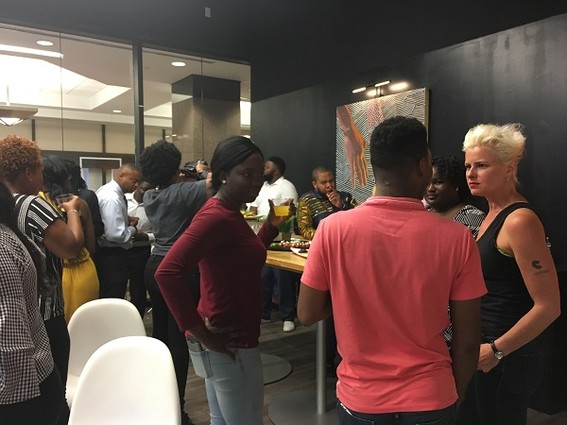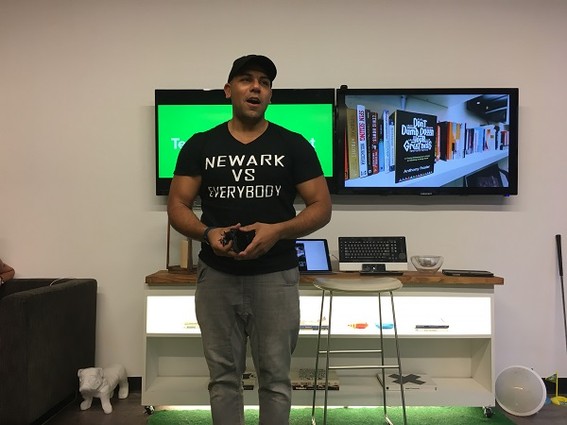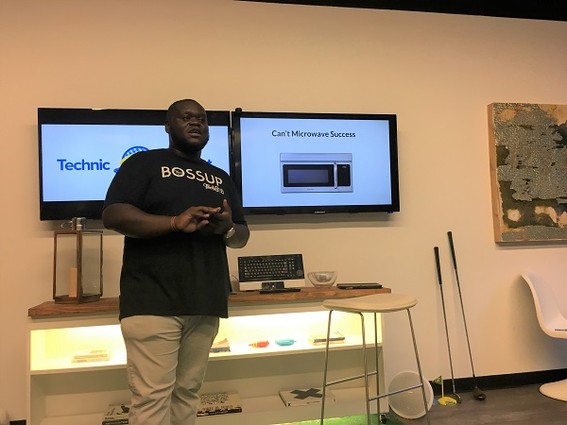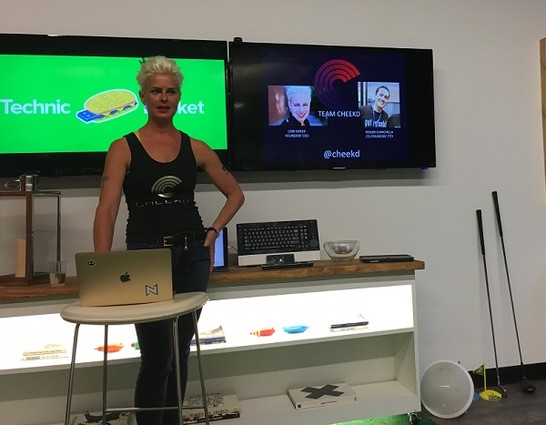Frasier and Cheek Wow Newark Crowd with Advice on How to Live Life, Promote Your Startup

Members of Newark’s thriving tech community filled the Public Space meeting venue at =SPACE (Newark) on Aug. 24 to hear from entrepreneurs Anthony Frasier and Lori Cheek, both of whom gave powerful presentations.
Frasier is one of the founding leaders of the Newark tech community, a serial entrepreneur and the author of Don’t Dumb Down Your Greatness: A Young Entrepreneur’s Guide to Thinking & Being Great.
Cheek is the founder of dating platform Cheekd and a new startup called “Networkd.” While Cheek lives in Manhattan, her development team is in New Jersey.
Medina (who goes by this single moniker), cofounder of =SPACE, made the introductory remarks, saying that he was proud to have =SPACE as a part of the Newark tech ecosystem. “We are one part of a much larger picture of what tech could be here, and I believe that the next round of innovators and the next round of disrupters are going to come from our community.”

The meeting was organized by Technic Basket (Newark), a new events company that wants to bring people together to share culture through technology; it was founded by Reginald Calixte, with Brendez Wineglass as the event director. This event featured tasty appetizers from Newark chef Stewart Lopez, of Cotidiano, located in 2 Gateway Center.
Speaking about his book, Frasier noted that while there is a lot of material out there about how to build a business, there isn’t a lot of material out there on how to build yourself. “I’m not up here saying I’m some sort of perfect being, cause I’m not, but there are a lot of things I learned in personal development over the years.”
Frasier shared his entrepreneurial journey, and then gave the audience insights on personal development that he lives by. He told the group to invest in themselves because there would be guaranteed returns. Frasier had invested in himself by teaching himself coding and working for free as an intern to learn the business. “If you don’t have money to invest, you can invest your time,” he advised.

Noting that good habits create good luck, Frasier said that he had adopted some of the insights of James Altucher, originator of the “Daily Practice,” a set of mental, physical, spiritual and emotional routines that help create new habits. For example, the mental routine can involve writing down 10 new ideas a day or reading a book. The physical routine can mean going to the gym, but also getting eight hours of sleep. The spiritual can simply entail listening, and the emotional can be doing things that will make you happy. “If you do these [things] every day, your life will change every few months. … Results may vary,” Frasier said.
Good things can also happen if you change your circle. “You are the average of the five people you hang with, but you are also the average of the five books you just read, the average of the five places you just went.” Changing a circle isn’t just about changing friends, it can be about changing your circle of activities.
Set three-month goals, he advised. “A lot of entrepreneurs set their goals top of the year for a year. Why not set three-month goals? In three months, I’m going to have this new blog set up. … In three months, I’m going to get paid for speaking at conferences,” for example.
Another piece of advice: You can’t microwave success. “This is something I think a lot of millennials struggle with. When we think about success, especially in the Instagram era, when you can look at entrepreneurs with their Jacuzzis and their Ferraris, we look at them and say, ‘I want to be an entrepreneur too.’” It looks easy and fun, but when new entrepreneurs get into it, they become angry because it’s not happening instantly. “This doesn’t happen in 30 seconds. This is a slow cook,” Frasier emphasized.

Cheek went through her entrepreneurial journey, providing insights into how she was able to promote her startup with little money. She started out as an architect and designer who moved to New York, where she didn’t know anyone. “When I first moved here I thought, ‘How am I going to start breaking the ice and making my new social circle here?’” She had a 16-year corporate career, but when the idea for Cheekd struck, “after 16 years of building someone else’s dream, I was now dedicated to building my own.”
Cheekd, which has evolved since its start, began with a deck of 50 dating cards that a person could slip to an intriguing stranger. The cards had a prewritten pickup line and a code that led to a privacy-protected profile. “It was a business card that didn’t have personal info on it, but had a quirky, flirty line. … They could find you without you having to talk to them.”
The idea struck in 2008. Cheek got some business partners on board, hired developers all over the world and finally had a website. But then she wondered, “How am I going to tell the world about this?”
“Like everything I’d been doing, I went big, and I wrote 20 of the biggest editors in New York City. … I just put one of my Cheekd notes in a black envelope with no note, no nothing, and sent it to 20 editors. And three weeks later the cover of the Style Section of The New York Times said ‘Move over Match.com. This is the new generation of online dating.’”
The day the article came out, Cheekd got many, many emails and its website shut down. A few days later, Cheek got a call from a producer at Oprah Winfrey’s show. “At this point I realized press was king. I was just going to keep going for press,” and this led to opportunities all over the world.
By then, Cheek said, she had garnered so much press that she was faking it until she made it. “I had done so many things to convince others that I was successful, I had convinced myself I was successful, when most people would have considered it failure. I think when you think you failed, you quit.
Cheek took advantage of every opportunity, from Cheekd sightings in Times Square to the Macy’s Thanksgiving Day Parade. “I was at a party for Chanel one night, and Russell Simmons was there. I was pretty good at magic and practiced sleight of hand. When he was having a conversation, I slipped that card in his pocket. … The next morning, I got a Google Alert that Cheekd was in the New York Observer, and the article said that ‘Russell Simmons gets Cheek’d at Chanel Soho.’”
A lesson she learned while doing all this is that opportunities come at unexpected times. “So nail your pitch. Have it down in one minute or 30 seconds.” She noted that you have to practice it many, many times and make sure you are ready for any audience at any time.
Then she began to pitch, including at the Hoboken Tech Meetup, which became the NJ Tech Meetup. She competed in and won many tech pitch competitions, and went to conferences whenever she could snag a table. “When everyone else had swag, I had rose petals that led up to my station.” She also launched a Kickstarter campaign.
Cheek became a “dating expert,” even though she is single to this day, and now often gets asked to be on dating panels. She would go to networking events five days a week, and never went out without her logoed clothing. When she travels anywhere, Cheek tweets at the local radio stations, telling them that the founder of a cool dating app will be in town, and that gets her radio interviews.
Her most poignant and interesting story was about how Cheek and her business Cheekd were ripped apart on the television show “Shark Tank,” and how she bounced back. Billionaire investor Kevin O’Leary told her to quit her “hobby” and shoot the business like a rabid dog. But Cheek had her revenge. The show attracted the attention of hundreds of thousands of people, and some were investors who wanted her to continue on her journey. She has made Cheekd into a Bluetooth app, and now, with the help of a new team in New Jersey, she’s developed Networkd.

